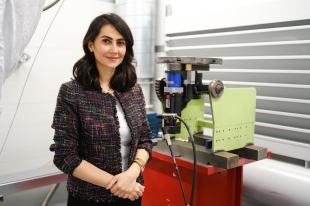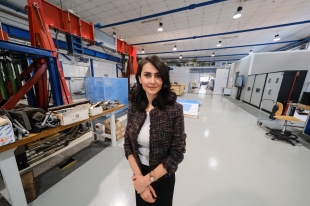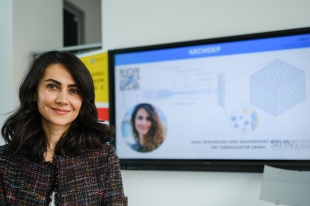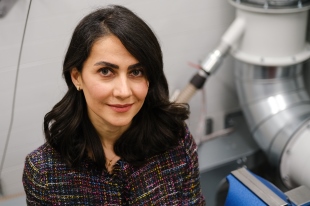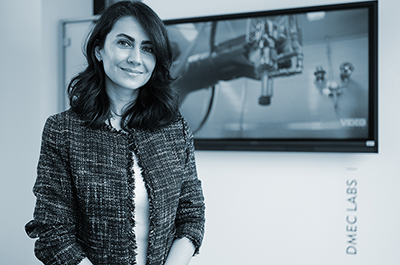
Sara Bagherifard won the prestigious ERC Consolidator Grant. The aim of ArcHIDep, the awarded project, is to develop a revolutionary system of solid-state deposition to obtain heterogeneous materials with a hierarchical architecture. Out of more than 2600 proposed projects, ArcHIDep is one of the two projects awarded by the @European Research Council submitted by @Politencico di Milano researchers.
ArcHIDep project goes beyond the state of the art of cold spray allowing to combine materials of substantially different characteristics to obtain heterogeneous structures with a hierarchical architecture. The aim of the project is to unravel the interaction between dissimilar phases, identify the variety of acting strengthening mechanisms and customize their collective contribution to the performance of the integrated structure. This will allow to exploit the synergy between compositional and architectural heterogeneity towards uncharted functional opportunities and will offer sustainable and efficient solutions, when necessary to meet multiple conflicting requirements.
Tell us the story of how and why did you choose to study at MeccPolimi
At the end of my MSc study at Iran University of Science and Technology, my MSc supervisor, asked me if I would be interested in pursuing a PhD. I was quite hesitant at the time, since I was already working part-time during my master studies in a company as a Design Engineer and was looking forward to implementing the theoretical concepts that I had learnt in university in real case industrial applications. I remember very well when just after my MSc defense, my supervisor, Prof. Majid Ayatollahi, told me he was confident I would be a successful researcher and that he strongly urged me to continue my studies to PhD! I was, of course, humbled with his kind remarks but still didn’t take the idea seriously. Few months later, he contacted me with an offer from his Italian collaborator, Prof. Mario Guagliano of DMEC, who was, at the time, searching for a PhD candidate. Checking out POLIMI’s website and Mario’s research profile, I got curious and after talking with Mario and knowing him and his research line better, I decided to apply for this PhD position! Although I must admit my main drive was not just the PhD study, but I was equally thrilled by the idea of living in Italy for few years, as I always admired the food, the culture!
How did you come up with the idea of applying for an “ERC Consolidator Grant”?
The idea of applying for ERC Consolidator Grant was born in the end of 2020, when due to uncertainties about my academic career at POLIMI, I decided to go to NTNU in Trondheim for a few months as an Adjunct Professor. There I had the opportunity to work with Prof. Filippo Berto’s group who is working on the cutting edge of structural integrity in AM. Through the presentations and discussions on possible collaborations and funding acquisitions, I also evaluated the option of applying for an ERC grant. It is difficult to decide when the right time is to apply for an ERC grant but considering where I stood in my career, I decided that this must be the right moment for me to try; with the continuous encouragement and support I received from Mario and Filippo, I got more and more determined. It took me few good months to elaborate the proposal idea and even longer to write it down, brainstorm, revise and polish all the details. I have to say it was an extremely demanding procedure filling any possible free time I had between the routine academic and teaching activities. Besides, the support I received from my colleagues and PhD students I have been directly working with, was essential. I also would like to thank the support provided by POLIMI research office.
Winning this grant, what does it mean to you?
The importance of an ERC funding is the freedom it offers in developing a hypothesis driven proposal. This is something rare, as unlike ERC-grants, almost all other available national and international funding schemes impose taking solid steps in directions for which you already have well-established methodologies and often times, extensive supporting data. ERC, on the other hand, offers notable assistance for exploring ideas that would be normally more difficult to investigate, of course, as long as you have a scientifically valid plan. Apart from the freedom it offers, this ERC-Co grant for me is a recognition of scientific achievements at a critical stage of my career. It gives me opportunity to consolidate my path, expand my research area and get access to resources and essential research ingredients that otherwise would have been inaccessible.
Which are the most challenging elements of this ERC project?
My ERC-Co project is very ambitious, as the high risk-high gain nature of ERC program entails; so, there will surely be multiple challenges associated with different phases of the project. I have already considered possible contingency plans for the potential key difficulties. Among the main challenges that I expect to tackle, I believe isolating the contribution of various acting strengthening mechanisms when dealing with heterogeneous materials without yet having a full understanding of their bonding state would be particularly tough. I also expect complexities associated with design optimization considering the problem of dimensionality. Indeed, the exceptionally wide range of variables that I can play with in ArcHIDep has the potential to be a double-edged sword! All that said, I am looking forward to deal with these challenges.
So, after winning this ERC Consolidator Grant, what’s next?
I would like to continuously increase the impact of my research and I hope this project will give me the momentum I need for that. I am very excited about starting a new area of research, training young scientists, establishing this topic as a long-lasting research line for my team.
What piece of advice would you give to a young researcher?
What I think is surely worth considering for a successful academic career is to have passion for what you do, enjoy doing it and don’t get disappointed although academia can be a quite tough and challenging environment sometimes; stay focused and have a theme around which to base your research. It is very important to build up solid knowledge in your field of interest, but at the same time do not miss the opportunity of participating in multidisciplinary projects; these can advance your creativity and help you look beyond the bench.

